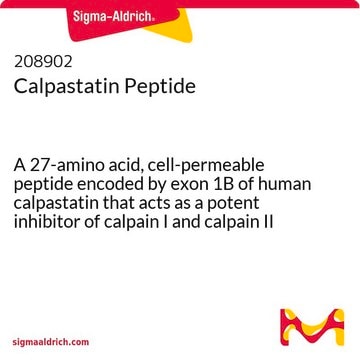662125
Ubiquitin Isopeptidase Inhibitor I, G5
The Ubiquitin Isopeptidase Inhibitor I, G5, also referenced under CAS 108477-18-5, controls the biological activity of Ubiquitin Isopeptidase. This small molecule/inhibitor is primarily used for Protease Inhibitors applications.
Synonym(s):
Ubiquitin Isopeptidase Inhibitor I, G5, 3,5-bis((4-Nitrophenyl)methylene)-1,1-dioxide, tetrahydro-4H-thiopyran-4-one, NSC-144303
About This Item
Recommended Products
Quality Level
Assay
≥97% (HPLC)
form
solid
manufacturer/tradename
Calbiochem®
storage condition
OK to freeze
protect from light
color
yellow
solubility
DMSO: 10 mg/mL
shipped in
ambient
storage temp.
2-8°C
General description
Biochem/physiol Actions
Ubiquitin isopeptidase activity
Packaging
Warning
Reconstitution
Other Notes
Aleo, E., et al. 2006. Cancer Res.66, 9235.
Legal Information
Storage Class Code
11 - Combustible Solids
WGK
WGK 2
Flash Point(F)
Not applicable
Flash Point(C)
Not applicable
Certificates of Analysis (COA)
Search for Certificates of Analysis (COA) by entering the products Lot/Batch Number. Lot and Batch Numbers can be found on a product’s label following the words ‘Lot’ or ‘Batch’.
Already Own This Product?
Find documentation for the products that you have recently purchased in the Document Library.
Related Content
Select different protease inhibitor types based on your needs to prevent protein degradation during isolation and characterization and safeguard proteins in sample prep.
Our team of scientists has experience in all areas of research including Life Science, Material Science, Chemical Synthesis, Chromatography, Analytical and many others.
Contact Technical Service







